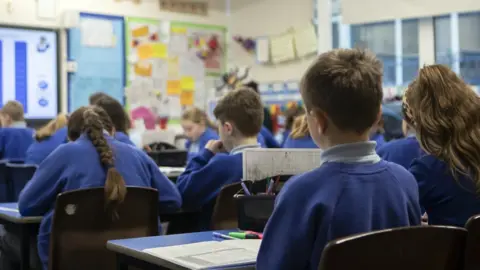Coronavirus: No free school meals during summer, says minister
 PA Media
PA MediaThe Department of Education (DE) cannot afford to continue to make payments to families eligible for free school meals over the summer.
That is according to Education Minister Peter Weir.
As schools are closed, the families of almost 97,000 children entitled to free school meals are receiving payments of £27 every fortnight per child instead.
The scheme was introduced in response to the coronavirus pandemic on 26 March at an initial cost of £19m.
The minister faced questions from MLAs on Stormont's education committee on Wednesday.
Free school meal payments to about 55,000 families of eligible children continued throughout the Easter school holiday.
'Absolutely realistic'
Mr Weir was asked by Sinn Féin MLA Karen Mullan if those payments could continue over the summer.
"I want to be absolutely realistic on this," said Mr Weir.
"With the normal departmental budget there is not money for free school meals from the department over the summer period.
"The amount of Covid resource within the executive is such that at the moment they're moving to a position of over-commitment before even anything could be considered, for instance, over the summer.
"The executive, as a whole, will need to take a view on that but in terms of continuation of payments it's certainly not something that can be done by the Department of Education.
"There simply isn't the money available."
 Getty Images
Getty ImagesMr Weir said as the Department for Communities (DfC) had taken wider responsibility for the feeding of vulnerable families, his department would be happy to co-operate with DfC if anything could be done.
Earlier, MLAs heard from representatives of the five teaching unions about the measures they wanted to be put in place before schools could re-open to more or all pupils.
'A school-to-school basis'
Jacquie White of the Ulster Teachers Union (UTU) said more pupils could only go back to school on the basis of "robust" public health advice.
She also said there were questions about how many children and staff could be safely accommodated in schools.
"We have had schools who, whenever they've been seeking to measure out classrooms safely, are ranging from anything from five children to 13 children in the class," she said.
"I think it's important these decisions are taken on a school to school basis."
Mark Langhammer of the National Education Union (NEU) said when children do return, the curriculum would have to be very different.
"The immediate focus on returning to school will probably be on care, on recovery, on resilience and well-being," he said.
"It won't be business as usual because re-opening is likely to be staged and difficult," he said.
"Schools will not be accommodating all pupils at all times so home-based learning will remain, in part."
"My best guess would be that somewhere between 20% and 40% of staff would be unlikely to be able to return due to underlying conditions, shielding, pregnancy, caring."
Mr Langhammer later suggested primary school pupils could be taught a "creative" curriculum to help them re-integrate, including things such as science through baking and cooking or planting seeds, reading for pleasure, writing to friends or helping out in their local area.
Mr Weir said that a "step-by-step approach" to re-opening schools was part of the executive's overall strategy for recovery.
Phased return
The minister has previously said that it was "extremely likely" there could be a phased return of pupils to school in September.
Mr Weir told the committee that the department would seek medical and scientific guidance on a number of practical areas ahead of that.
"What will be necessary in terms of PPE? What will be necessary in terms of hygiene? What will be necessary in terms of testing? What will be necessary in terms of social distancing?" he said.
"There's clear input that's going have to be put in from the medical side on that."
Mr Weir also said the department was "at the start of a process" when it came to the phased re-opening of schools.